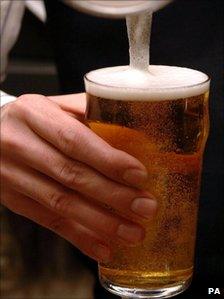Schooner set to join pint after drinks measures review
- Published

Pints have been sold since 1698 when an act of Parliament introduced them
The centuries-old cry of "fancy a pint?" may soon become "fancy a schooner?" under plans to relax the strict rules dictating drink sizes.
The government is to allow licensed premises in England, Scotland and Wales to sell alcohol in smaller measures.
Pints and halves will still be sold, but beer and cider will be available for the first time in schooners - an Australian two-third pint measure.
Wine will also be sold in 75ml sizes, much smaller than the standard 175ml.
The Department for Business, Innovation and Skills aims to introduce the changes over the next three months.
Science Minister David Willetts said he wanted to remove "unnecessary" red tape surrounding the current system.
"No pub or restaurant should break the law by selling a customer a sample of wine," he said.
'British icon'
"We have listened to consumers and businesses. They have called for fixed quantities to be kept but with greater flexibility. That is what this change will deliver."
Current regulations mean draught beer must be sold in pints (equivalent to 568ml), halves (284ml) or the little-known "thirds", and wine in measures of 250ml, 175ml or 125ml.
Most bars and restaurants only use the latter measure for champagnes and other sparkling wines, although some bars do run promotions for a small glass of wine of this size, which equals one-sixth of a standard bottle.
Fortified wine, meanwhile, is currently sold in 175ml or 125ml measures, which will be allowed to be reduced to 70ml and 50ml sizes.
The British Beer and Pub Association (BBPA) welcomed the new measures.
Chief executive Brigid Simmonds said: "Choice is good for customers, and more choice over drinks sizes in pubs is something we have lobbied for over many years.
"While the pint remains a great British icon, the two-thirds pint will give greater flexibility over how beer is served.
"This is particularly important when it comes to getting more women to choose beer, as many avoid the traditional pint glass."
She added that beer should be enjoyed in a wider range of glass styles and measures, and that the current "anomaly" was "daft".
The pint measure has been served in hostelries and pubs since its introduction by an Act of Parliament in 1698.
- Published7 October 2010